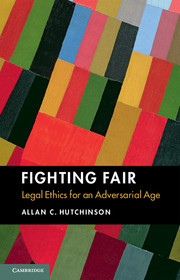7 - Fighting Fair
Published online by Cambridge University Press: 05 August 2015
Summary
The debate within military and legal ethics about the nature and limits of the professional means used to achieve appropriate and just ends is part of a larger and more expansive moral debate around ‘fair play’. The primary quandary is over both whether the ends can ever justify the means and whether different ends warrant different means: If the end is so warranted and so just can it sanction the use of any means to achieve it? Or does the resort to unjust and extreme means go so far as to negate or invalidate the previous justness of the ends sought? These are pertinent and perennial challenges for both military officers and professional lawyers. Most would agree that, even if the ends to be pursued were entirely just and warranted, this does not give people carte blanche to achieve those ends by whatever means possible. This would be less an ethical stance and more an abandonment of one.
ENDS AND MEANS
The basic thrust of military ethics is that any and all violence in war must be justified: it counsels a minimalist approach. No matter how just or worthy the cause undertaken, the prosecution of a just war demands that only just methods be used – the moral defensibility of the ends do not justify the resort to any possible means to achieve them. Moreover, the ethical focus is on both the why and the how of military action. Intentions and consequences must be evaluated together. Bad motives can taint what would otherwise be a justified consequence. Indeed, on a more general scale, if warring parties engage in unjust means, this can seriously compromise the justness of the war being waged. Accordingly, violence that is not militarily necessary violates jus in bello, but not all violence deemed militarily necessary is morally permissible.
- Type
- Chapter
- Information
- Fighting FairLegal Ethics for an Adversarial Age, pp. 88 - 109Publisher: Cambridge University PressPrint publication year: 2015



